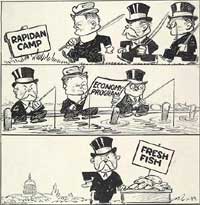

Well everything helpsAs the Depression tightened its hold on American life, avid angler President Herbert Hoover cast about for ways to improve the economy. He sometimes took working vacations at his fishing camp on the Rapidan River (now in Shenandoah National Park) with members of Congress and his administration. Well everything
helps, 1930 or 1931 |
|
|
|
|
"O, death! O, change! O, time!"On February 5, 1937 President Franklin Delano Roosevelt proposed increasing the number of Supreme Court justices from nine to fifteen. He announced that for every justice who did not quit the bench after turning seventy, he would be empowered to appoint a new justice, totaling six. This would have altered a court that had struck down such New Deal creations as the Agricultural Adjustment Act (AAA) and the National Industrial Recovery Act (NRA). After six months, the plan failed under opposition from both Democrats and Republicans. "O, death!
O, change! O, time!" 1937 |
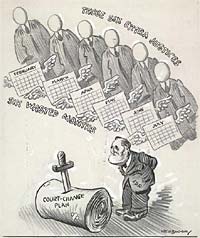 |
|
|
|
"Cannon to right of them, cannon to left of them"During the 1948 presidential election, Southern Democrats rebelled, protesting President Harry Truman's civil rights program, while left-leaning Democrats split off to form the Progressive Party under the leadership of Henry A. Wallace. This prompted Herb Block to invoke the heroic, if ill-fated warrior in Alfred Tennyson's The Charge of the Light Brigade. Truman surprised almost everyone by winning the election in November. "Cannon
to right of them, cannon to left of them,"
February 23, 1948 |
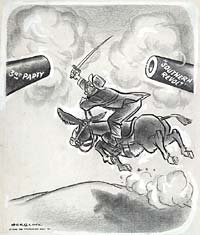 |
|
|
|
"Tsk Tsk -- Somebody Should Do Something About That"President Dwight Eisenhower was frequently accused of failure to provide leadership on domestic problems. Among Herb Block's criticisms of the administration was Eisenhower's lack of support for the Supreme Court's 1954 ruling for desegregation. Eisenhower said we all have opinions and lamented that "you can't change the hearts of men by laws." The leadership vacuum persisted long after the Court's ruling, which allowed time for the organization of White Citizens councils, of "massive resistance" and confrontations that continued beyond Eisenhower's term. In 1956, two years after the Court's ruling, Eisenhower's view on integration was that it should proceed more slowly. "Tsk Tsk
-- Somebody Should Do Something
|
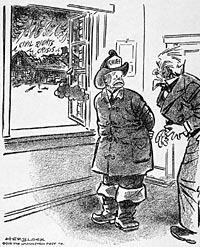 |
|
|
|
"Throw him some more flowers, honey -- let's see how long he'll keep playing"President John F. Kennedy gave stirring speeches proposing initiatives of the New Frontier, among them a payroll plan for aid to the elderly that later became Medicare and proposals to remedy civil rights problems. But even his own congressional leaders didn't seem completely saddled up for the New Frontier. And "anti-administration" Democrats joined with Republicans in a coalition that resisted his programs and proposals. "Throw him
some more flowers, honey—let's see how long he'll keep playing,"
July 18, 1962 |
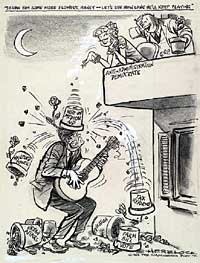 |
|
|
|
"Ev tu?"On May 24, 1966, Illinois Republican Everett Dirksen took the Senate floor to call for a "thorough discussion of the diplomatic, military and political situation in Vietnam." He attacked President Lyndon Johnson for lack of candor as military engagements increased and United States warplanes carried out a record number of air strikes on North Vietnam. The cartoon alludes William Shakespeare's Julius Caesar, where Caesar says, "Et tu, Brute?" when stabbed by Brutus, and the title plays on Dirksen's first name, Everett. "Ev tu?"
June 10, 1966 |
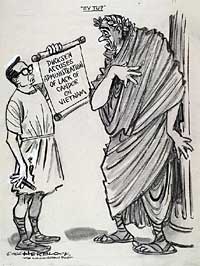
|
|
|
|
National-security blanketOn May 22, 1973, President Richard Nixon admitted that he had concealed aspects of the case involving the break-in at Democratic headquarters in the Watergate Hotel in Washington. He did so, he said, to protect national security "operations." Nixon affirmed his innocence and said he would stay in office. Herb Block, whose earliest cartoons critical of Nixon had appeared twenty-five years before, saw Nixon seeking cover amidst evidence of wiretapping, break-in, political sabotage, laundered FBI funds from Mexico, and other illegal activities. National-security
blanket, May 27, 1973 |
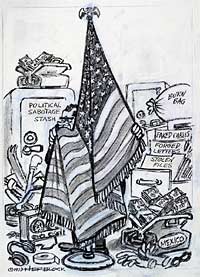 |
|
|
|
"Gee! A medal from Gen. Goldwater"During the 1976 presidential election, incumbent President Gerald Ford received only modest support from his influential colleague Senator Barry Goldwater. In a letter to delegates of the Republican National Convention, Goldwater wrote that his endorsement "rests solely on the fact that at this time in our history I do not believe that our government can suffer through months and months of reorganization that [would] be necessary" if Ford lost the election. President Ford, visiting Valley Forge at the time to celebrate the nation's Bicentennial, ultimately received the Republican nomination but lost in the general election to Democrat Jimmy Carter. "Gee! A
medal from Gen. Goldwater," July 2, 1976 |
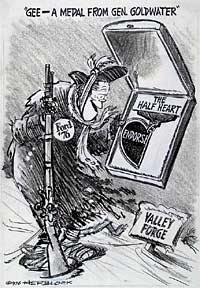 |
|
|
|
"It comes out fuzzy"On May 12, 1978, President Jimmy Carter agreed to a tax-cut package under pressure from Congress and the Federal Reserve Board, seeking to end an economic recession. Image consultant Gerald Rafshoon set about to alter the public perception of Carter as being indecisive. But his efforts were soon overwhelmed when Iranians took Americans hostage. Carter's ill-conceived attempt at a military rescue of the hostages resulted in a desert disaster, with loss of American lives and planes. "It comes
out fuzzy," May 21, 1978 |
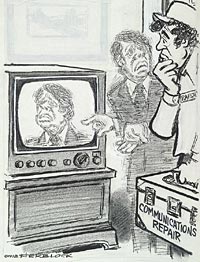 |
|
|
|
Cardboard Ronald ReaganUnlike Carter, President Ronald Reagan projected a strong image. His own Iranian hostage situation exploded in scandal, and his attempts to establish a presence in Lebanon cost the lives of 241 Marines. Among the Reagan administration domestic scandals was one involving the Environmental Protection Agency (EPA), which led to the indictment of one EPA official and the forced resignation of another. Herb Block notes, "The agency was one of many stacked to fit Reagan policies. Corruption in the Housing and Urban Development Agency took the form of awarding agency money to developers who would make campaign contributions. But it was the Iran-Contra scandals that shook the country and his administration. Through all this, Reagan remained popular, and his image was upheld." [Cardboard Ronald
Reagan], March 5, 1987 |
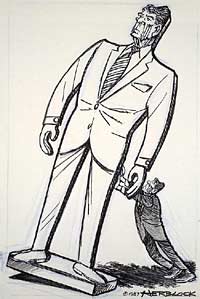 |
|
|
|
"I was out of the loop"During the 1992 election, President George Bush came under scrutiny for his role as vice-president during the Iran-contra scandals. Bush claimed to be "out of the loop" about the arms deal. Democratic candidate Bill Clinton made Bush's role a central issue in his run for the White House. Clinton's running mate, Senator Al Gore, referred to notes released by an aide to former Secretary of State George Shultz that belied Bush's claim. As the campaign drew to a close, more information linked Bush to the scandal. One of Bush's last acts as president was his issuance of pardons to Iran-contra figures who had been indicted, pled guilty or been found guilty. "I was
out of the loop", October 4, 1992 |
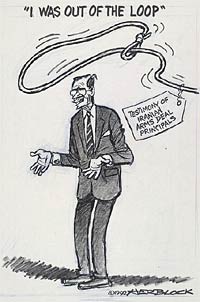 |
|
|
|
BalanceAllegations of an affair between President Bill Clinton and former White House intern Monica Lewinsky became public on January 21, 1998. Although Clinton repeatedly and forcefully denied. any improper relationship, which later testimony proved his statements untrue and resulted in a House vote of impeachment. While fending off these accusations, Clinton proposed the first balanced budget in nearly 30 years. Balance,
February 4, 1998 |
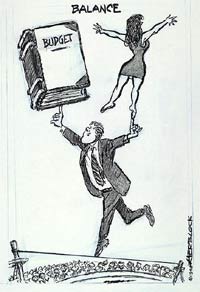 |
Library of Congress Help Desk ( November 9, 2001 )
